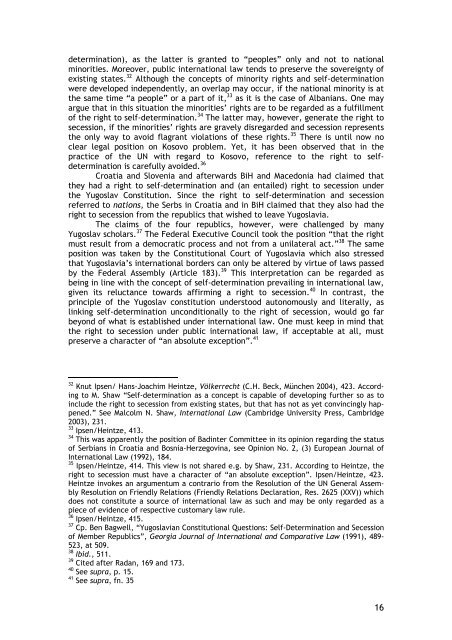Synthetic report - EURAC
Synthetic report - EURAC
Synthetic report - EURAC
You also want an ePaper? Increase the reach of your titles
YUMPU automatically turns print PDFs into web optimized ePapers that Google loves.
determination), as the latter is granted to “peoples” only and not to national<br />
minorities. Moreover, public international law tends to preserve the sovereignty of<br />
existing states. 32 Although the concepts of minority rights and self-determination<br />
were developed independently, an overlap may occur, if the national minority is at<br />
the same time “a people” or a part of it, 33 as it is the case of Albanians. One may<br />
argue that in this situation the minorities’ rights are to be regarded as a fulfillment<br />
of the right to self-determination. 34 The latter may, however, generate the right to<br />
secession, if the minorities’ rights are gravely disregarded and secession represents<br />
the only way to avoid flagrant violations of these rights. 35 There is until now no<br />
clear legal position on Kosovo problem. Yet, it has been observed that in the<br />
practice of the UN with regard to Kosovo, reference to the right to selfdetermination<br />
is carefully avoided. 36<br />
Croatia and Slovenia and afterwards BiH and Macedonia had claimed that<br />
they had a right to self-determination and (an entailed) right to secession under<br />
the Yugoslav Constitution. Since the right to self-determination and secession<br />
referred to nations, the Serbs in Croatia and in BiH claimed that they also had the<br />
right to secession from the republics that wished to leave Yugoslavia.<br />
The claims of the four republics, however, were challenged by many<br />
Yugoslav scholars. 37 The Federal Executive Council took the position “that the right<br />
must result from a democratic process and not from a unilateral act.” 38 The same<br />
position was taken by the Constitutional Court of Yugoslavia which also stressed<br />
that Yugoslavia’s international borders can only be altered by virtue of laws passed<br />
by the Federal Assembly (Article 183). 39 This interpretation can be regarded as<br />
being in line with the concept of self-determination prevailing in international law,<br />
given its reluctance towards affirming a right to secession. 40 In contrast, the<br />
principle of the Yugoslav constitution understood autonomously and literally, as<br />
linking self-determination unconditionally to the right of secession, would go far<br />
beyond of what is established under international law. One must keep in mind that<br />
the right to secession under public international law, if acceptable at all, must<br />
preserve a character of “an absolute exception”. 41<br />
32 Knut Ipsen/ Hans-Joachim Heintze, Völkerrecht (C.H. Beck, München 2004), 423. According<br />
to M. Shaw “Self-determination as a concept is capable of developing further so as to<br />
include the right to secession from existing states, but that has not as yet convincingly happened.”<br />
See Malcolm N. Shaw, International Law (Cambridge University Press, Cambridge<br />
2003), 231.<br />
33 Ipsen/Heintze, 413.<br />
34 This was apparently the position of Badinter Committee in its opinion regarding the status<br />
of Serbians in Croatia and Bosnia-Herzegovina, see Opinion No. 2, (3) European Journal of<br />
International Law (1992), 184.<br />
35 Ipsen/Heintze, 414. This view is not shared e.g. by Shaw, 231. According to Heintze, the<br />
right to secession must have a character of “an absolute exception”. Ipsen/Heintze, 423.<br />
Heintze invokes an argumentum a contrario from the Resolution of the UN General Assembly<br />
Resolution on Friendly Relations (Friendly Relations Declaration, Res. 2625 (XXV)) which<br />
does not constitute a source of international law as such and may be only regarded as a<br />
piece of evidence of respective customary law rule.<br />
36 Ipsen/Heintze, 415.<br />
37 Cp. Ben Bagwell, “Yugoslavian Constitutional Questions: Self-Determination and Secession<br />
of Member Republics”, Georgia Journal of International and Comparative Law (1991), 489-<br />
523, at 509.<br />
38 Ibid., 511.<br />
39 Cited after Radan, 169 and 173.<br />
40 See supra, p. 15.<br />
41 See supra, fn. 35<br />
16

















